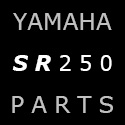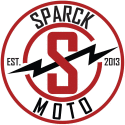I'm looking at upgrading my carbs on my CB900. I've seen some people use late 80's gsxr carbs and then obviously the Keihin CRs. GSXR carbs have been too hard to find and the CR's are just too expensive for my cheap ass. So then I saw some people use 2 Mikuni VM36's and I think that's the route that I'm going to go. I've seen the kits that some people make and to be honest I feel that they are too much money and the intakes aren't the greatest quality. I have no doubts that I can fab up a better intake but the only question I have is how to mount the carbs to the intake manifolds. It looks like the carbs mounting flange have an OD of 43mm. I can't seem to find anything that's gasoline resistant with a 43mm ID. If someone could point me in the right direction that would be great.
We noticed you are blocking ads. DO THE TON only works with community supporters. Most are active members of the site with small businesses. Please consider disabling your ad blocking tool and checking out the businesses that help keep our site up and free.
You are using an out of date browser. It may not display this or other websites correctly.
You should upgrade or use an alternative browser.
You should upgrade or use an alternative browser.
CB900 Carb Upgrade Question
- Thread starter kbaszak
- Start date
CXman of this fair parish is a purveyor of those fine twin VM kits and I would suspect that he invested time and cash in working out the jetting.
If you want to make your own manifolds, look for something like this https://www.amazon.com/dp/B000GZO4V0?tag=duckduckgo-ffnt-20&linkCode=ogi&th=1&psc=1 I don't buy from Amazon unless it's the last resort, but check that part and make sure it's the right size for the carbs you want to use. You will need to manufacture flanges to mount those and machine 4 inlet stubs and make a jig to hold it all together and weld it all up. That will get you started and after that you need to jet the carbs to suit.
I have no idea what time and cash that might all cost, but you can work out if it's worth it to you to go that route.
Personally, I'd probably see if Randaak's has a set of jets and gaskets for the stock carbs and rebuild teh OEM ste, or keep looing for a set of GSXR carbs if you know which ones you need. I think someone posted a link to CB100 web site in a past thread.
If you want to make your own manifolds, look for something like this https://www.amazon.com/dp/B000GZO4V0?tag=duckduckgo-ffnt-20&linkCode=ogi&th=1&psc=1 I don't buy from Amazon unless it's the last resort, but check that part and make sure it's the right size for the carbs you want to use. You will need to manufacture flanges to mount those and machine 4 inlet stubs and make a jig to hold it all together and weld it all up. That will get you started and after that you need to jet the carbs to suit.
I have no idea what time and cash that might all cost, but you can work out if it's worth it to you to go that route.
Personally, I'd probably see if Randaak's has a set of jets and gaskets for the stock carbs and rebuild teh OEM ste, or keep looing for a set of GSXR carbs if you know which ones you need. I think someone posted a link to CB100 web site in a past thread.
teazer and all
the research and development challenge is not just jetting and that is not the biggest cost
first every kit i make i have to buy and rig one or 2 of the model bikes and put at least one of the road
as you would know getting wide open power jetting does not give you a street-able combination
so i use one bike for road and ride -ability testing with a few different riders the other bike is used
for dyno pulls and testing for temperature spectrum each kit need 10-12 dyno hours to test the bike with at least
stock exhaust and 2 of the more popular 4-1 pipes so you guessed it i have to buy beg or borrow (and pay shipping)
to get the other exhaust systems in order to work out the different jetting combinations and what mods to do to the carbs themselves
once i release the kit i gte rid of one of the bikes but keep the road test bike for 2-3 years in case any issues pop up
that i need to road test or duplicate.
next part of the cost is the "the intakes aren't the greatest quality "
the intakes are all function NOT form or art pieces and that is what they have to be as well as leak proof and stay put in the mountings
The intakes are built to follow as closely as possible the models and test protoypes that have gone thru many hours of flow testing
on a superflow wet test bench (not cheap) battling fuel condensating and droplet reformation, cylinder flow balance and frosting
THEN you have to work at duplication so that means plasma cut parts cnc machined flanges
jigs controlling warping then grinding and finishing to then join with all to get them to the point where "the intakes aren't the greatest quality "
but they work and they are deceptively simple in the changes and incremental adjustments needed to balance flow re condensation and packaging
(getting them to fit on and in the bike)
in the case of the cb900 i still own 2 a custom and f model i have not ridden either in 2-3 years but they are ready to go if needed
and they will probably be sold off next year
last but really not least is the cost of support and time is pend making sure each of my customers is happy and has these working properly
most of my customers buy there carbs last and feel they are "expert " enough to decide that is the bike does not run perfect its the carbs fault
to alleviate this and give my self a base line to diagnose problems each and every set of carbs i sell is run on a setup bench test engine
by either me or one other trained person that arbs are balanced at idle set for sync under load conditions and tested at wide open throttle
i then drain and pack them.along with a custom made throttle cable to match the correct type motorcycle .
i send them out to customers and tell them to install them and follow the correct cable routing the most important part of the install
and go run the bike and if the bike does not run perfect to call me but not fiddle with anything prior calling (that does not always happen of course)
this is where everyone say my carbs are to rich they are blah blah blah
and some starty making changes and doing there own guessing in some cases i need to get them to send teh carbs back so i can reset them (i do this for free)
but suffice to say so far i /we have bee able to get them all running great . and in all my sales i have only adjusted the jetting on 2 bikes world wide
one on a bike a cx500 in puerto rico that the gentleman runs avgas in it all the time so i put a bit smaller pilot
the other a cb 750 that is owned buy a person that just putts it around and never goes on the highway and i had to cut the fueling back.
the only other jetting changes are on modded bikes i usually try to avoid dealing with unknown mods but get trapped into the once in a while
and they are very time consuming.
my development costs have to be amortized into the firsst 500-1000 kits as the bill quickly gets up there.
AND then come the many that do mental math and figure cost of the pair of carbs plus what they feel the intakes and other stuff is just to much money.
doing it right is not cheap. doing it wrong is even more expensive though.
hope this gives you some perspective on doing this
Maybe one of my customers who are on her might chip in with there side of the experience of working with me and or getting
one of my kits and using it .
the research and development challenge is not just jetting and that is not the biggest cost
first every kit i make i have to buy and rig one or 2 of the model bikes and put at least one of the road
as you would know getting wide open power jetting does not give you a street-able combination
so i use one bike for road and ride -ability testing with a few different riders the other bike is used
for dyno pulls and testing for temperature spectrum each kit need 10-12 dyno hours to test the bike with at least
stock exhaust and 2 of the more popular 4-1 pipes so you guessed it i have to buy beg or borrow (and pay shipping)
to get the other exhaust systems in order to work out the different jetting combinations and what mods to do to the carbs themselves
once i release the kit i gte rid of one of the bikes but keep the road test bike for 2-3 years in case any issues pop up
that i need to road test or duplicate.
next part of the cost is the "the intakes aren't the greatest quality "
the intakes are all function NOT form or art pieces and that is what they have to be as well as leak proof and stay put in the mountings
The intakes are built to follow as closely as possible the models and test protoypes that have gone thru many hours of flow testing
on a superflow wet test bench (not cheap) battling fuel condensating and droplet reformation, cylinder flow balance and frosting
THEN you have to work at duplication so that means plasma cut parts cnc machined flanges
jigs controlling warping then grinding and finishing to then join with all to get them to the point where "the intakes aren't the greatest quality "
but they work and they are deceptively simple in the changes and incremental adjustments needed to balance flow re condensation and packaging
(getting them to fit on and in the bike)
in the case of the cb900 i still own 2 a custom and f model i have not ridden either in 2-3 years but they are ready to go if needed
and they will probably be sold off next year
last but really not least is the cost of support and time is pend making sure each of my customers is happy and has these working properly
most of my customers buy there carbs last and feel they are "expert " enough to decide that is the bike does not run perfect its the carbs fault
to alleviate this and give my self a base line to diagnose problems each and every set of carbs i sell is run on a setup bench test engine
by either me or one other trained person that arbs are balanced at idle set for sync under load conditions and tested at wide open throttle
i then drain and pack them.along with a custom made throttle cable to match the correct type motorcycle .
i send them out to customers and tell them to install them and follow the correct cable routing the most important part of the install
and go run the bike and if the bike does not run perfect to call me but not fiddle with anything prior calling (that does not always happen of course)
this is where everyone say my carbs are to rich they are blah blah blah
and some starty making changes and doing there own guessing in some cases i need to get them to send teh carbs back so i can reset them (i do this for free)
but suffice to say so far i /we have bee able to get them all running great . and in all my sales i have only adjusted the jetting on 2 bikes world wide
one on a bike a cx500 in puerto rico that the gentleman runs avgas in it all the time so i put a bit smaller pilot
the other a cb 750 that is owned buy a person that just putts it around and never goes on the highway and i had to cut the fueling back.
the only other jetting changes are on modded bikes i usually try to avoid dealing with unknown mods but get trapped into the once in a while
and they are very time consuming.
my development costs have to be amortized into the firsst 500-1000 kits as the bill quickly gets up there.
AND then come the many that do mental math and figure cost of the pair of carbs plus what they feel the intakes and other stuff is just to much money.
doing it right is not cheap. doing it wrong is even more expensive though.
hope this gives you some perspective on doing this
Maybe one of my customers who are on her might chip in with there side of the experience of working with me and or getting
one of my kits and using it .
Last edited:
I built a chopper with a 1977 CB750 engine and ran a set a Murray's carbs. I have a set on a CB650 powered CB550 I'm currently building. My budgets are tight on any build, as I'm just a teacher doing this stuff for fun. It's an addiction, so I do a few builds a year and to keep it up, my margins are slim. I typically try to piece together carb kits from Ebay through used stuff, but after fiddling with the 750's stock setup longer than I wanted, I went with Murray's rig. I promise you they are worth every dime. I can see where someone building a $20k show bike may bulk at the utilitarian look of his intakes. Aluminum welding is not always going to look like the crazy art images found on Pintrest. These intakes function, and they function well. They are extremely well built. Regardless of what anyone thinks of their looks, I still showed my chopper and have won Best in Class, so I know they don't detract either. There were real world, measurable performance gains with the kit. It was flawless over the 3 years I rode it before selling the chopper this winter. It was a vintage chopper that I honestly called my turn-key daily. It never failed to fire up on 2 kicks. It never fouled plugs. It went from 0 - 80 in under 3 seconds. No Harley on the road could beat me in an 1/8 mile drag race. It cruised perfectly in the 50 - 60 mph range. I never had to send them back to Murray, but I did make several calls to get the bike tuned. His customer service is wonderful and rare for companies nowadays. He worked me through tuning the bike in ways beyond the carbs, ie timing curves, etc.
I am all for being an enterprising builder and designing and building stuff myself. "Built not Bought", right? That being said, I felt the need to defend a very good carb kit. I have bought two of his kits and I will continue to buy more. There's a good chance I end up putting his kits on most inline four bikes I build. They are worth the price. $600 is really not crazy money in the grand scheme of things. You'll spend half the price in new Mikuni's anyway, and they don't come jetted right. No matter what the vendor claims, expect another $50 or so in tuning. I would put the intakes somewhere around $150 of the cost. Murray may correct me, but that's how I did the math when determining whether or not I would buy his kit. $150 for those intakes is a really good price. If you think about it, you're probably forking out no more than $100 for someone else to do all the work. We're also talking about a kit that fits onto a stock bike without any frame modifications. That's huge.
I am all for being an enterprising builder and designing and building stuff myself. "Built not Bought", right? That being said, I felt the need to defend a very good carb kit. I have bought two of his kits and I will continue to buy more. There's a good chance I end up putting his kits on most inline four bikes I build. They are worth the price. $600 is really not crazy money in the grand scheme of things. You'll spend half the price in new Mikuni's anyway, and they don't come jetted right. No matter what the vendor claims, expect another $50 or so in tuning. I would put the intakes somewhere around $150 of the cost. Murray may correct me, but that's how I did the math when determining whether or not I would buy his kit. $150 for those intakes is a really good price. If you think about it, you're probably forking out no more than $100 for someone else to do all the work. We're also talking about a kit that fits onto a stock bike without any frame modifications. That's huge.




